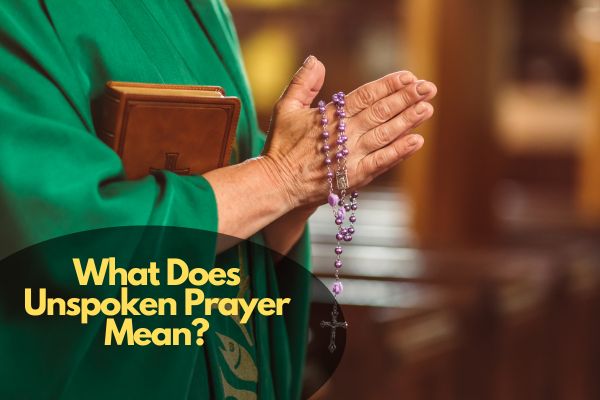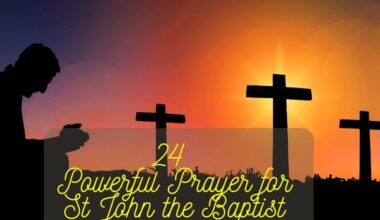You may be wondering what unspoken prayer means. It refers to the act of communicating with a higher power without uttering words aloud. It is a form of prayer where individuals engage in silent conversations with God, expressing their thoughts, feelings, and desires without verbalizing them.
This article will look into the meaning, purpose, and potential benefits of unspoken prayer, as well as provide insights on how to practice it effectively.
What Does Unspoken Prayer Mean?
Unspoken prayer, also known as silent prayer or wordless prayer, involves a deep and intimate connection with a higher power through silent communication. It is a form of prayer that transcends spoken language and relies on the power of thoughts, intentions, and emotions. In unspoken prayer, individuals engage in a profound inner dialogue with God, expressing their deepest longings and seeking spiritual guidance without articulating their words verbally.
The Purpose of Unspoken Prayer
Unspoken prayer serves several purposes and has profound significance in the spiritual journey of individuals. Here are some key purposes of engaging in unspoken prayer:
1. Creating a Sacred Space
Engaging in unspoken prayer allows individuals to create a sacred space within themselves. By silencing external distractions and turning their attention inward, they cultivate an environment of stillness and presence, enabling a deeper connection with the divine. It provides an opportunity to transcend the limitations of spoken language and connect with God on a profound spiritual level.
2. Expressing Authenticity and Vulnerability
Unspoken prayer provides a space for individuals to express their authentic selves and be vulnerable before God. Without the constraints of verbal expression, they can lay bare their deepest thoughts, emotions, and desires. This form of prayer allows for a transparent and honest exchange with God, fostering a deeper sense of connection and understanding.
3. Enhancing Intuition and Spiritual Sensitivity
Engaging in unspoken prayer can enhance an individual’s intuition and spiritual sensitivity. By quieting the mind and entering a state of inner stillness, individuals become more attuned to the subtle workings of the divine presence. This heightened spiritual awareness enables them to receive insights, guidance, and revelations from God that may not be readily accessible through spoken prayer.
4. Cultivating Trust and Surrender
Unspoken prayer provides an opportunity for individuals to cultivate trust and surrender to the divine will. By relinquishing the need for verbal control and surrendering their thoughts and desires to God, individuals demonstrate their faith and reliance on a higher power. This act of surrender opens the door for divine intervention and guidance in their lives.
Benefits of Unspoken Prayer
Engaging in unspoken prayer can bring about numerous benefits and transformative experiences in the lives of individuals. Here are some key benefits:
1. Deepening Spiritual Connection
Unspoken prayer allows individuals to deepen their spiritual connection with God. By bypassing verbal communication and connecting on a soul level, individuals can experience a profound sense of closeness and intimacy with the divine. This deepening spiritual connection can provide comfort, guidance, and a sense of purpose in their lives.
2. Cultivating Inner Peace and Stillness
Engaging in unspoken prayer promotes inner peace and stillness. By entering a state of silence and solitude, individuals can quiet the mind, release stress and anxiety, and experience a sense of calmness. This inner peace and stillness create a fertile ground for spiritual growth, self-reflection, and personal transformation.
3. Encouraging Self-Reflection and Self-Awareness
Unspoken prayer encourages self-reflection and self-awareness. Through silent introspection, individuals can gain insights into their thoughts, emotions, and desires. This self-awareness allows them to address their fears, limitations, and areas for personal growth, fostering a journey of self-discovery and self-improvement.
4. Strengthening Faith and Trust
Engaging in unspoken prayer can strengthen an individual’s faith and trust in God. By relying on silent communication, individuals learn to trust in the divine presence and the power of God’s guidance. This strengthened faith empowers them to face life’s challenges with confidence, knowing that they are supported by an all-loving and all-knowing higher power.
How to Practice Unspoken Prayer
Practicing unspoken prayer requires a willingness to embrace silence, stillness, and inner reflection. Here are some steps to help you practice unspoken prayer effectively:
1. Find a Quiet and Peaceful Environment
Choose a quiet and peaceful environment where you can minimize external distractions. Find a comfortable space where you can sit or kneel in a relaxed position.
2. Set Your Intention
Before you begin, set your intention for the prayer session. Reflect on what you wish to communicate or seek guidance on, and hold that intention in your heart.
3. Enter a State of Stillness
Close your eyes and take a few deep breaths to center yourself. Allow your body and mind to relax, letting go of any tension or thoughts that arise. Focus on the present moment and enter a state of inner stillness.
4. Engage in Inner Dialogue
Silently express your thoughts, feelings, and desires to God. Speak from your heart, allowing your inner dialogue to flow naturally. You may visualize yourself having a conversation with God or simply offering your thoughts and emotions silently.
5. Listen and Receive
After expressing your thoughts, listen attentively to any guidance or insights that may arise within you. Be open to receiving messages, signs, or intuitive nudges from the divine. Trust in the process and remain receptive.
6. Express Gratitude
Conclude your unspoken prayer session by expressing gratitude for the opportunity to connect with the divine. Thank God for listening and for any guidance or blessings received during the prayer.
Conclusion
Unspoken prayer is a powerful practice that allows individuals to communicate with a higher power without uttering words aloud. It provides a sacred space for expressing thoughts, emotions, and desires, fostering a deep spiritual connection and personal transformation. By engaging in unspoken prayer, individuals can cultivate inner peace, strengthen their faith, and receive divine guidance. Embrace the practice of unspoken prayer and embark on a journey of spiritual growth and connection with the divine.
FAQs
Q: Is unspoken prayer only for religious individuals?
A: No, unspoken prayer can be practiced by individuals of any religious or spiritual background. It is a form of prayer that transcends specific beliefs or denominations and focuses on the personal connection with a higher power.
Q: Can unspoken prayer be practiced in a group setting?
A: Yes, unspoken prayer can be practiced individually or in a group setting. In a group, individuals can engage in silent prayer together, creating a collective energy and intention for spiritual connection and guidance.
Q: How long should an unspoken prayer session last?
A: The duration of an unspoken prayer session can vary depending on individual preferences and time availability. Some individuals may find benefit in shorter sessions of 5-10 minutes, while others may prefer longer sessions of 20-30 minutes or more. Find a duration that feels comfortable and conducive to your spiritual practice.






